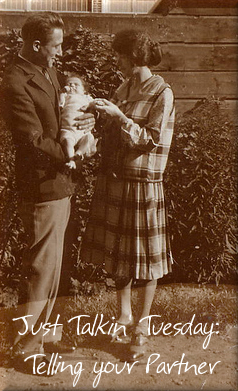It’s dark. You are both collapsed into heaps, this time, you managed to make it to bed. You sigh, close your yes and mutter goodnight into your pillow.
It’s 234 a.m., your wife notes.
“Waaaaaaaaaahhhhhhhhhhhhhhhhhhh!”
You lift your head and glare at the clock.
It’s 315 a.m.
You shove your face back into your pillow and silently scream.
Really? 46 minutes?
Sighing, you get out of bed to get the baby. Check the diaper. A little wet so you change it. Rock, sing, soothe. Nothing works.
Time to get mommy. She’s got the food.
You walk into the bedroom to wake her up. She sighs, shifts, and snuggles closer to the bed. When you do manage to wake her up, she snaps at you.
“But I JUST nursed! Did you check the diaper? Try to put him back down? I’m tired. I don’t want to…. ”
“Yes. Gimme a little credit. I’m not an idiot. I’ve tried everything. Clearly he’s hungry. You’re nursing so…”
“Dammit. I’ll be there in a minute.” She snuggles back into the bed.
You sigh, loudly, frustrated, knowing it will be a good 30 minutes before she even attempts to get out of bed. She will fall back asleep and you will have this conversation all over again before she finally gets out of bed, cursing you under her breath for interrupting her sleep.
She won’t mean it. She’s exhausted, just like you. And yes, you have work in the morning and should be sleeping but she won’t get to sleep much during the day either. Oh, she may rest, but it won’t be restorative. She’ll nod off while nursing, try to snooze when the baby does, but if the baby is up, she is up. And then there are chores. Dishes. Laundry. Cleaning. Cooking. Possibly other children to care for. Errands. Her job? Never.friggin.ends.
Your job never ends either. It’s hard for her to see that though. What SHE sees is you, walking out the front door toward other adults. Toward freedom. Toward conversation that involves more than a few garbled syllabic words at a time. What SHE sees is you, showered, shaved, dressed in something other than the same pajamas she’s now lived in for two weeks. What SHE feels is jealousy, hatred, sadness, grief. For the most part she knows it’s not rational. Somewhere, deep down, she tries hard not to feel this way. But she’s been moody for weeks now. Snapping at you for the simplest comment or action.
You bring home dinner. It’s not what she wanted but she loudly sighs and announces “It’ll have to do.” You pick up the baby and she watches your every move with him like a hawk, waiting for you to falter. You begin to falter yourself. Are you built for fatherhood? Are you doing things wrong? What if you’re screwing up your kid for life at just 3 months old? What if she never lets you really be a father? How will you ever learn what to do? Will your marriage survive? Where the hell are you?
What she doesn’t know is that as you walk out the front door every morning, your heart hurts. YOU are filled with jealousy because she gets to enjoy every moment with your son. She gets to watch him grow, change, and do new things every day. You mourn your fatherhood as you shower, dress for work. You fumble under her judgmental stares, worrying that your fathering skills are not up to par with her expectations. You’ve asked a million times but you can’t for the life of you get her to tell you what her expectations are for you as a father. What are the rules to this ball game? If you only knew, life would be so much easier. After all, you’re not a mind reader.
___________________________
Today’s Just Talking Tuesday is cross-posted with The Postpartum Dads Project. If you’re a mom, please go visit the Postpartum Dads Project and share what you wish your husband had known about Postpartum Mood Disorders and parenting. What would have best helped you when you were suffering? If you’re a dad, share here. What got you and your wife through those dark days? How did you keep communication open if you managed to do so?
(Note: The Postpartum Dads Project site is down for the moment. Let’s all just share here for now and I will cross post when the site is back up! Thanks for understanding.)
Social support is key for recovery from a Postpartum Mood Disorder. The best social support starts at home with your partner. Get them involved and you’ve zoomed forward a zillion spaces on your recovery path.
Let’s get to just talking.

